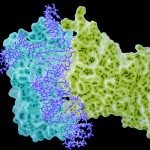Lien vers Pubmed [PMID] – 19309732
Protein Sci. 2009 Apr;18(4):792-800
Amyloid aggregation is linked to a number of neurodegenerative syndromes, the most prevalent one being Alzheimer’s disease. In this pathology, the beta-amyloid peptides (Abeta) aggregate into oligomers, protofibrils, and fibrils and eventually into plaques, which constitute the characteristic hallmark of Alzheimer’s disease. Several low-molecular-weight compounds able to impair the Abeta aggregation process have been recently discovered; yet, a detailed description of their interactions with oligomers and fibrils is hitherto missing. Here, molecular dynamics simulations are used to investigate the influence of two relatively similar tricyclic, planar compounds, that is, 9, 10-anthraquinone (AQ) and anthracene (AC), on the early phase of the aggregation of the Abeta heptapeptide segment H(14)QKLVFF(20), the hydrophobic stretch that promotes the Abeta self-assembly. The simulations show that AQ interferes with beta-sheet formation more than AC. In particular, AQ intercalates into the beta-sheet because polar interactions between the compound and the peptide backbone destabilize the interstrand hydrogen bonds, thereby favoring disorder. The thioflavin T-binding assay indicates that AQ, but not AC, sensibly reduces the amount of aggregated Abeta(1-40) peptide. Taken together, the in silico and in vitro results provide evidence that structural perturbations by AQ can remarkably affect ordered oligomerization. Moreover, the simulations shed light at the atomic level on the interactions between AQ and Abeta oligomers, providing useful insights for the design of small-molecule inhibitors of aggregation with therapeutic potential in Alzheimer’s disease.

